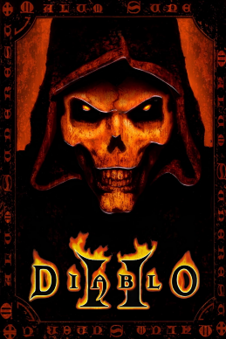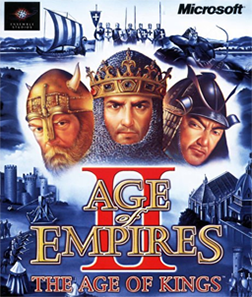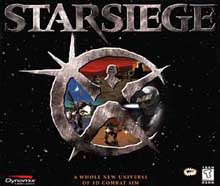
Diablo II is an action role-playing hack-and-slash computer video game developed by Blizzard North and published by Blizzard Entertainment in 2000 for Microsoft Windows, Classic Mac OS, and macOS. The game, with its dark fantasy and horror themes, was conceptualized and designed by David Brevik and Erich Schaefer, who, with Max Schaefer, acted as project leads on the game. The producers were Matthew Householder and Bill Roper. The game was developed over a 3-year period, with a crunch time of 1.5 years long.

Half-Life is a first-person shooter game developed by Valve and published by Sierra Studios for Microsoft Windows in 1998. It was Valve's debut product and the first game in the Half-Life series. Players assume the role of Gordon Freeman, a scientist who must escape the Black Mesa Research Facility after it is invaded by aliens. The core gameplay consists of fighting alien and human enemies with a variety of weapons and solving puzzles.

Half-Life: Opposing Force is an expansion pack for the first-person shooter game Half-Life. The game was developed by Gearbox Software and Valve and published by Sierra On-Line for Windows on November 19, 1999. Opposing Force was the first expansion for Half-Life and was announced in April 1999. Lead designer Randy Pitchford noted that he believed Gearbox was selected to develop Opposing Force because Valve, the creators of Half-Life, wanted to concentrate on their future projects. Over the course of development, Gearbox brought in a variety of talent from other areas of the video games industry to help bolster various aspects of design.

Alien vs. Predator is a science-fiction/action/horror media franchise. The series is a crossover between the Alien and Predator franchises, depicting the two species as being in conflict with one another. It began as a comic book series in 1989, before being adapted into a video game series in the 1990s. Produced and distributed by 20th Century Fox, the film series began with Alien vs. Predator (2004), directed by Paul W. S. Anderson, and was followed by Aliens vs. Predator: Requiem (2007), directed by the Brothers Strause, and the development of a third film has been delayed indefinitely. The series has led to numerous novels, comics, and video game spin-offs such as Aliens vs. Predator released in 2010.

Age of Empires II: The Age of Kings is a real-time strategy video game developed by Ensemble Studios and published by Microsoft. Released in 1999 for Microsoft Windows and Macintosh, it is the second game in the Age of Empires series. The Age of Kings is set in the Middle Ages and contains thirteen playable civilizations. Players aim to gather resources, which they use to build towns, create armies, and defeat their enemies. There are five historically based campaigns, which constrict the player to specialized and story-backed conditions, as well as three additional single-player game modes; multiplayer is also supported.

Starsiege is a mecha-style vehicle simulation game developed by Dynamix and released in 1999. Starsiege is set in the Metaltech/Earthsiege universe, which contains its predecessors Earthsiege (1994), Battledrome (1994), and Earthsiege 2 (1996). This universe also includes action game Hunter Hunted (1996), strategy games Mission Force: Cyberstorm (1996) and Cyberstorm 2: Corporate Wars (1998). It also includes the sequels Starsiege: Tribes and all subsequent Tribes titles. In 2015, this game and the rest of the Metaltech/Tribes series were released as freeware by Hi-Rez Studios, but Battledrome and the Cyberstorm series were not.

Rebellion Developments Limited is a British video game developer based in Oxford, England. Founded by Jason and Chris Kingsley in December 1992, the company is best known for its Sniper Elite series and multiple games in the Alien vs. Predator series. Sister company Rebellion Publishing has published comic books since 2000, when it purchased 2000 AD, the publisher of characters such as Judge Dredd and Rogue Trooper.

Aliens Versus Predator 2 is a science fiction first-person shooter video game developed by Monolith Productions and published by Sierra On-Line for Microsoft Windows in October 2001, and for Mac OS X in July 2003. The game is a sequel to Aliens Versus Predator (1999); both games are based on the characters of the Alien and Predator media franchises as well as the Alien vs. Predator crossover series. It is set on the fictional planet LV-1201, which houses a vast series of ruins infested with Aliens that is routinely visited by a clan of Predators who hunt the creatures for sport.

Gearbox Software is an American video game development company based in Frisco, Texas. It was established as a limited liability company in February 1999 by five developers formerly of Rebel Boat Rocker. Randy Pitchford, one of the founders, serves as president and chief executive officer. Gearbox initially created expansions for the Valve game Half-Life, then ported that game and others to console platforms. In 2005, Gearbox launched its first independent set of games, Brothers in Arms, on console and mobile devices. It became their flagship franchise and spun off a comic book series, television documentary, books, and action figures. Their second original game series, Borderlands, commenced in 2009, and by 2015 had sold over 26 million copies. The company also owns the intellectual property of Duke Nukem and Homeworld.

Alien vs. Predator (エイリアンVSプレデター) is a 1994 beat 'em up video game developed and released by Capcom for the CPS-2 arcade game system. It is based on the science fiction franchise of the same name. In the game, the players take control of up to three out of four cyborg and Predator characters in a battle against the Alien hordes and rogue human soldiers. The game was very well received by the public and by media publications, but was never ported to any home system.

Redneck Rampage is a 1997 first-person shooter game developed by Xatrix Entertainment and published by Interplay. The game is a first person shooter with a variety of weapons and levels, and has a hillbilly theme, primarily taking place in a fictional Arkansas town. Many of the weapons and power-ups border on the nonsensical, and in some ways the game is a parody of both first person shooter games and rural American life. It features music by psychobilly and cowpunk artists such as The Beat Farmers and Mojo Nixon. The game has been re-released on GOG.com and Steam with support for Windows and macOS.

Alien vs Predator is a 1994 first-person shooter developed by Rebellion Developments and published by Atari Corporation for the Atari Jaguar on October 21 and later in Japan by Mumin Corporation on December 8 of the same year, where it became a pack-in game when the console was launched in the region. It is the first game in the Alien vs. Predator franchise to be developed by Rebellion.

Warhammer 40,000: Rites of War is a turn-based strategy game based on the Panzer General 2 engine by SSI. It is set in the fictional Warhammer 40,000 universe. It was produced by Games Workshop in 1999, and concerns the invasion of a Tyranid Hive fleet and the Eldar and Imperial efforts to defeat it. The game was re-released in 2015 on GOG.com.

Alien vs Predator is a 1993 beat 'em up video game for Super Nintendo Entertainment System, developed by Jorudan and published by Information Global Service in Japan and by Activision internationally. An arcade game of the same title was released by Capcom eight months later, but the two games are different and their storylines are unrelated to each other.

Aliens vs. Predator: Requiem is a 2007 American science fiction action film directed by the Brothers Strause in their directorial debut and written by Shane Salerno. The film stars Steven Pasquale, Reiko Aylesworth, John Ortiz, Johnny Lewis and Ariel Gade.
Alien is a science-fiction horror/action media franchise centered on the film series which depicts warrant officer Ellen Ripley and her battles with an extraterrestrial lifeform, commonly referred to as "the Alien" or Xenomorph.

Aliens vs. Predator: Requiem is a 2007 action game exclusive to the PlayStation Portable, developed by Rebellion Developments and published by Vivendi Games. It was released in November 2007 in North America and Europe, and December 2007 in Australia. It is part of the Alien vs. Predator franchise, an amalgamation of the Alien and Predator franchises. Aliens vs. Predator: Requiem is a tie-in to the film of the same title, which was released shortly after the game.

Aliens vs. Predator is a 2010 first-person shooter video game developed by Rebellion Developments, the team behind the 1994 Atari Jaguar game and the 1999 Microsoft Windows game and published by Sega for Microsoft Windows, PlayStation 3 and Xbox 360. The game is not a sequel to the previous game Aliens versus Predator 2, but a reboot based on the Alien vs. Predator franchise, a combination of the characters and creatures of the Alien franchise and the Predator franchise.

Aliens versus Predator: Extinction is a 2003 military science fiction real-time strategy video game developed by Zono and published by Electronic Arts for the PlayStation 2 and Xbox. Based on the Alien vs. Predator franchise, the game offers three single player campaigns that cover Alien, Predator, and human storylines. Each storyline and species has unique characteristics and gameplay elements that are adapted from film and comic sources.


















